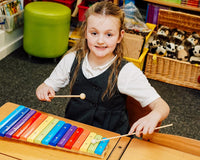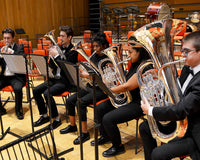GOOD FOR YOUR BRAIN
 Train your brain
Train your brain
When playing any instrument, there is so much to think about at the same time, whilst your brain is processing hundreds of this information each second. Playing music trains you to think faster and smarter.
 Memory & reading
Memory & reading
Playing an instrument makes you use both sides of your brain at the same time, which strengthens memory power. Music and reading are also related via common neural and cognitive mechanisms.
 Makes you smarter
Makes you smarter
Studies show a correlation between music and academic success, in any age. Learning an instrument stimulates the brain, improving functions which are essential for maths and science.
 Concentration
Concentration
Improving your musical skills forces you to use all the parts of your brain involved in concentration, making you better able to concentrate in other life situations (hence why music is beneficial for disorders like ADD).
GREAT FOR YOUR MENTAL STATE
 Makes you happy
Makes you happy
Studies show that babies who took interactive music classes displayed better early communication skills and smiled more.
Music makes you healthier. It doesn't just sharpen up your mind and reduce stress. It can certainly help you relax after a tough day at school or work.
 Reduces stress
Reduces stress
Listening to music can have a tremendously relaxing and beneficial effect on our emotions and physiological functions. It has even been proven to lower heart rate and blood pressure, and decrease levels of depression, anxiety and stress hormones.
 Sense of achievement
Sense of achievement
Messed up a solo in rehearsal, then totally nailed it at the performance? Playing and succeeding at a musical instrument gives you a huge sense of pride and achievement, especially when you manage to perfect a passage you’ve been struggling with for weeks.
 Playing music if fun!
Playing music if fun!
We can harp on about all the scientifically accurate benefits to learning a musical instrument, but what matters most is that it’s enjoyable for the player. While other hobbies like watching TV are passive, playing music actively engages and stimulates the brain, making you feel happy and occupied.
GAIN OTHER SKILLS, AS WELL MUSIC
 Boosts your team skills
Boosts your team skills
Playing an instrument isn’t only good for your brain, it’s also great for expanding your social circle. Joining a musical group and contributing to the overall success of the group encourages you to develop relationships with new people and builds skills in leadership and team-building.
 Builds confidence
Builds confidence
Playing an instrument helps you get comfortable with self-expression. As children begin to master their instrument and start playing in public, it can help them to feel confident in presenting their work in a non-academic context.
 More creative
More creative
Practising a piece of music does wonders for the creative side of your brain. No matter how much a composer annotates their composition, they cannot fully express how a piece of music should be played. So it is up to the player to inject some of their personality into the music.
 Time management
Time management
Learning an instrument requires practice, of course! But more specifically, it requires consistency and routine. Figuring out how to fit practice into your busy schedule and really stick to it helps you develop better time management and organization skills.
 Train your brain
When playing any instrument, there is so much to think about at the same time, whilst your brain is processing hundreds of this information each second. Playing music trains you to think faster and smarter.
Train your brain
When playing any instrument, there is so much to think about at the same time, whilst your brain is processing hundreds of this information each second. Playing music trains you to think faster and smarter.
 Memory & reading
Playing an instrument makes you use both sides of your brain at the same time, which strengthens memory power. Music and reading are also related via common neural and cognitive mechanisms.
Memory & reading
Playing an instrument makes you use both sides of your brain at the same time, which strengthens memory power. Music and reading are also related via common neural and cognitive mechanisms.
 Makes you smarter
Studies show a correlation between music and academic success, in any age. Learning an instrument stimulates the brain, improving functions which are essential for maths and science.
Makes you smarter
Studies show a correlation between music and academic success, in any age. Learning an instrument stimulates the brain, improving functions which are essential for maths and science.
 Concentration
Improving your musical skills forces you to use all the parts of your brain involved in concentration, making you better able to concentrate in other life situations (hence why music is beneficial for disorders like ADD).
Concentration
Improving your musical skills forces you to use all the parts of your brain involved in concentration, making you better able to concentrate in other life situations (hence why music is beneficial for disorders like ADD).
 Makes you happy
Studies show that babies who took interactive music classes displayed better early communication skills and smiled more.
Music makes you healthier. It doesn't just sharpen up your mind and reduce stress. It can certainly help you relax after a tough day at school or work.
Makes you happy
Studies show that babies who took interactive music classes displayed better early communication skills and smiled more.
Music makes you healthier. It doesn't just sharpen up your mind and reduce stress. It can certainly help you relax after a tough day at school or work.
 Reduces stress
Listening to music can have a tremendously relaxing and beneficial effect on our emotions and physiological functions. It has even been proven to lower heart rate and blood pressure, and decrease levels of depression, anxiety and stress hormones.
Reduces stress
Listening to music can have a tremendously relaxing and beneficial effect on our emotions and physiological functions. It has even been proven to lower heart rate and blood pressure, and decrease levels of depression, anxiety and stress hormones.
 Sense of achievement
Messed up a solo in rehearsal, then totally nailed it at the performance? Playing and succeeding at a musical instrument gives you a huge sense of pride and achievement, especially when you manage to perfect a passage you’ve been struggling with for weeks.
Sense of achievement
Messed up a solo in rehearsal, then totally nailed it at the performance? Playing and succeeding at a musical instrument gives you a huge sense of pride and achievement, especially when you manage to perfect a passage you’ve been struggling with for weeks.
 Playing music if fun!
We can harp on about all the scientifically accurate benefits to learning a musical instrument, but what matters most is that it’s enjoyable for the player. While other hobbies like watching TV are passive, playing music actively engages and stimulates the brain, making you feel happy and occupied.
Playing music if fun!
We can harp on about all the scientifically accurate benefits to learning a musical instrument, but what matters most is that it’s enjoyable for the player. While other hobbies like watching TV are passive, playing music actively engages and stimulates the brain, making you feel happy and occupied.
 Boosts your team skills
Playing an instrument isn’t only good for your brain, it’s also great for expanding your social circle. Joining a musical group and contributing to the overall success of the group encourages you to develop relationships with new people and builds skills in leadership and team-building.
Boosts your team skills
Playing an instrument isn’t only good for your brain, it’s also great for expanding your social circle. Joining a musical group and contributing to the overall success of the group encourages you to develop relationships with new people and builds skills in leadership and team-building.
 Builds confidence
Playing an instrument helps you get comfortable with self-expression. As children begin to master their instrument and start playing in public, it can help them to feel confident in presenting their work in a non-academic context.
Builds confidence
Playing an instrument helps you get comfortable with self-expression. As children begin to master their instrument and start playing in public, it can help them to feel confident in presenting their work in a non-academic context.
 More creative
Practising a piece of music does wonders for the creative side of your brain. No matter how much a composer annotates their composition, they cannot fully express how a piece of music should be played. So it is up to the player to inject some of their personality into the music.
More creative
Practising a piece of music does wonders for the creative side of your brain. No matter how much a composer annotates their composition, they cannot fully express how a piece of music should be played. So it is up to the player to inject some of their personality into the music.
 Time management
Learning an instrument requires practice, of course! But more specifically, it requires consistency and routine. Figuring out how to fit practice into your busy schedule and really stick to it helps you develop better time management and organization skills.
Time management
Learning an instrument requires practice, of course! But more specifically, it requires consistency and routine. Figuring out how to fit practice into your busy schedule and really stick to it helps you develop better time management and organization skills.















